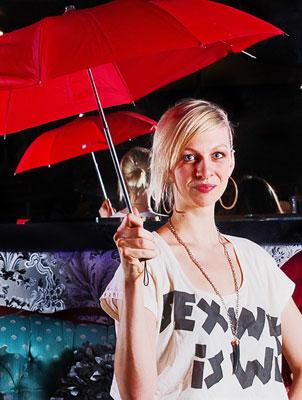Frédérique Chabot is a kickass hero who is not afraid to flaunt it. As one of Xtra’s Community Activist Award winners, Chabot posed for the Heroes photo shoot in leather boots, thigh-high tights, garters and sloganed T-shirt, holding a red umbrella.
Chabot is the face of POWER — Prostitutes of Ottawa/Gatineau Work, Educate and Resist. She can be seen at every protest and community event holding POWER’s red banner with “Sex workers’ rights are human rights” written boldly across it.
For Chabot, visibility is key.
“I am really excited [about the award] as it means there is a lot of visibility, or increasing visibility around the issue and around the work that POWER does,” she says. “There is so much that has been happening, so I feel that POWER deserves it — I guess I take this award as going to POWER.”
POWER is a volunteer organization founded in 2008. Its members are sex workers and allies who believe that fighting for sex workers’ rights is an integral part of a larger fight for social justice.
In December 2010, POWER catapulted into the mainstream media after Chabot and co-author Christine Bruckert published a report called “Challenges: Ottawa Sex Workers Speak Out.” The report outlines the challenges faced by sex workers and presents a strong argument for the decriminalization of sex work.
At the same time the report was released, POWER requested that the Ontario Human Rights Commission launch a public inquiry into discrimination against Ottawa-area sex workers by the Ottawa Police Service.
According to Chabot, the two events helped POWER gain momentum. Sex workers have conducted educational workshops for themselves, and other members have stepped up to speak out publicly about sex workers’ rights.
“It’s like arms that are growing, which is really exciting,” says Chabot.
POWER’s exposure has also attracted the support of sex workers’ rights groups across the country. These groups have offered their resources and volunteer services to help POWER engage in upcoming legal battles.
In September 2010, Judge Susan Himel, of the Ontario Court of Appeal, struck down three Criminal Code provisions connected to prostitution — communicating for the purposes of prostitution, living off the avails of prostitution and operating a common bawdyhouse.
Himel stayed the order for a period of 30 days, meaning that her decision would not become effective until after that date. The Federal government appealed Himel’s decision, and the stay was extended to April 2011, when the appeal will be heard.
POWER has applied to be an intervenor in the case. According to Chabot, the organization is building a team of human rights lawyers who will argue on its behalf. It is a long-term strategy that could keep POWER legally entangled for several years.
On a more immediate level, Chabot is happy that her Hero award puts POWER in the public eye.
“The fact that it is a community activism award — it is actually pretty symbolic because sex workers are not part of communities; they are “others,” they are outsiders — we “sweep” them out,” she says. “Getting an activism award means we are an integral part of a certain community.”
Chabot is happy with the way POWER is moving forward, but she feels the struggle has a long way to go.
“The more public I become, the more I have been exposed to more stories, more experiences. While this is amazing in terms of connections it also means that I am more aware of a lot of bullshit,” she says. “It’s a balance, I guess. There is a feeling as if you are in a battle, so it hardens you. But also makes you feel really proud and happy.”

 Why you can trust Xtra
Why you can trust Xtra


